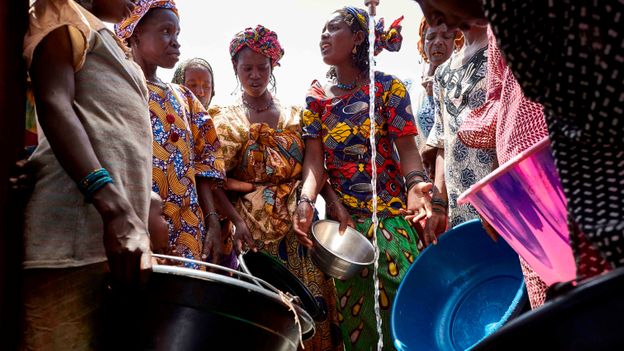
The hamlet of Dialangou is in the midst of this arid area, 7km (4.3 miles) from the town of Mopti. The population has rapidly grown from 400 to more than 1,400 residents, due to internal displacement. This growth meant that the quantity of drinking water was no longer sufficient, and the pumps were far from the village. Limited access to clean water had an impact on the hygiene and health of children in the village. Lack of water has promoted the spread of water-borne diseases, and also hampered children’s education. This educational impact particularly affects girls, who in Malian culture are responsible for the fetching of water.
Dutch researcher Christine van Wijk-Sijbesma from the International Water and Sanitation Center writes that in the family, cultural factors, such as isolation, household composition and the distribution of work influence the distribution of chore of collecting water. “Girls get involved in this activity from an early age, depending on the workload and mobility of their mothers,” she writes. “In polygamous households, the more difficult tasks tend to be delegated to the younger women.”
A manual pump installed in March 2020 in Dialangou allows residents to avoid having to use water from the pond near the village, whose troubled waters were a source of major health problems, including diarrheal diseases such as cholera and schistosomiasis.
So far the micro-wells seem to be working. The water from the Dialangou borehole was analysed by the Mopti Regional Water Laboratory this year and the results showed that water met the required quality standards in Mali.
A total of 161 boreholes have now been drilled in the Mopti region using the manual technique. But the scale of the challenge remaining is still huge. Nationally, almost a quarter of the population does not have access to clean water, according to the international NGO Water Aid.
Local authorities, communities and NGOs working to create micro-wells are up against constant challenges. The more an area is in need of a well, the greater local tensions are likely to be, making its construction more difficult. “In some areas, it is impossible to do anything given the insecurity that reigns,” says Cissé.
--
The emissions from travel it took to report this story were 0kg CO2, as the writer interviewed sources remotely. The digital emissions from this story are an estimated 1.2g to 3.6g CO2 per page view. Find out more about how we calculated this figure here.
--
Join one million Future fans by liking us on Facebook, or follow us on Twitter or Instagram.
If you liked this story, sign up for the weekly bbc.com features newsletter, called “The Essential List”. A handpicked selection of stories from BBC Future, Culture, Worklife, and Travel, delivered to your inbox every Friday.
"search" - Google News
July 31, 2020 at 06:22AM
https://ift.tt/3gf3RFx
The search for water in a desert conflict zone - BBC News
"search" - Google News
https://ift.tt/2QWB6Sh
Bagikan Berita Ini














0 Response to "The search for water in a desert conflict zone - BBC News"
Post a Comment